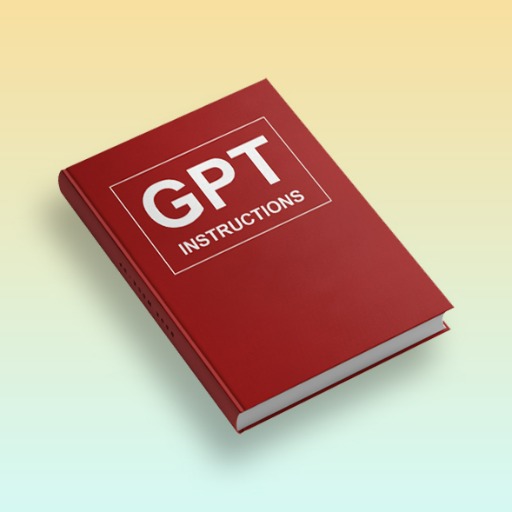PaperGPT Principled Instructions Are All You Need-Principled Instructions for Enhanced Prompting
AI-powered Prompt Optimization for Quality Responses
Start a quiz on the 26 prompt principles
Summarize the paper
Show me how to prompt successfully with examples
Display a table of the 26 prompt principles
Tell me the authors
What is the abstract of the paper?
Related Tools
Load More
GPT Instruction Genius
[V4] Crafts detailed instructions from your ideas, to create GPTs that provide structured and consistent outputs. Tip: Write '/changelog' to see the latest changes!

Instruction Creator
Custom GPT instruction creation guide. Copyright (C) 2024, Sourceduty - All Rights Reserved.

GPT Instructions Enhancer
Take your GPT instructions to the next level
Bullet Point GPT

GPT Instruction Builder
Write your GPT instructions, context, persona, constraints. The more detailed the better.

GPTGPT
A GPT that helps you create GPTs.
20.0 / 5 (200 votes)
Introduction to PaperGPT Principled Instructions Are All You Need
PaperGPT Principled Instructions Are All You Need is a specialized educational tool designed to guide users in the art of prompt engineering. It is based on the paper 'Principled Instructions Are All You Need,' which outlines 26 principles to improve the quality of prompts for large language models (LLMs) like GPT-3.5 and GPT-4. The primary function of PaperGPT is to educate users on creating precise and effective prompts, enhancing the interactions between users and LLMs. This tool provides examples and scenarios that demonstrate how different principles can be applied to generate more accurate and contextually relevant responses from LLMs. For instance, one scenario involves adjusting the prompt to account for the intended audience, such as explaining a complex topic in simple terms for a child or using technical language for experts. This differentiation helps LLMs tailor their responses appropriately, showcasing the flexibility and adaptability of these models when given well-crafted instructions.

Main Functions of PaperGPT Principled Instructions Are All You Need
Educational Guidance on Prompt Engineering
Example
Users learn how to create prompts that specify the desired response style, such as factual, creative, or concise.
Scenario
A user working on a research project needs detailed factual responses. They use PaperGPT to craft prompts that request 'detailed explanations supported by evidence,' ensuring the LLM provides thorough and accurate information.
Real-Time Feedback and Improvement
Example
PaperGPT offers immediate feedback on user-generated prompts, highlighting strengths and areas for improvement.
Scenario
During a live session, a user tests different prompt formulations. PaperGPT evaluates each prompt's effectiveness and suggests modifications, like adding specific instructions or removing ambiguous language, to refine the user's approach.
Interactive Quizzes and Assessments
Example
Interactive quizzes test users' understanding of the 26 principles, providing scores and detailed feedback.
Scenario
After studying the principles, a user takes a quiz to assess their comprehension. The quiz presents scenarios requiring the application of multiple principles, and PaperGPT provides explanations for each correct or incorrect response, reinforcing the learning process.
Ideal Users of PaperGPT Principled Instructions Are All You Need
Researchers and Developers
These users are often involved in creating and refining LLM applications. They benefit from PaperGPT by learning advanced prompt engineering techniques that can enhance model performance and accuracy, especially in specialized domains such as technical documentation or scientific research.
Educators and Students
Educators use PaperGPT to teach students about AI and natural language processing. Students, on the other hand, utilize it to understand how to interact effectively with LLMs, making it a valuable resource for coursework and projects involving AI. The structured guidance helps students grasp complex concepts and apply them in real-world scenarios.

Using PaperGPT Principled Instructions Are All You Need
Visit aichatonline.org for a free trial without login, also no need for ChatGPT Plus.
Access the platform and explore its features without any sign-up or payment requirements.
Familiarize Yourself with the 26 Principles
Review the 26 guiding principles provided in the PDF to understand how to structure and design effective prompts.
Apply Principles to Prompt Creation
Use the principles to craft your prompts, ensuring clarity, context relevance, and task alignment.
Test and Iterate
Experiment with different prompts, review the responses, and refine your prompts based on the model's output.
Utilize Feedback Mechanisms
Incorporate feedback from the model to further improve prompt design, aiming for concise, accurate, and high-quality responses.
Try other advanced and practical GPTs
Human Logic AI
Empowering human logic with AI precision.

Combinatorics and Probability Tutor
AI-powered learning for combinatorics and probability.

Tweet King
Empower Your Tweets with AI

GPT Revisor - Assistente de escrita jurídica
AI-powered legal text refinement

GPT Explorer
Explore tailored AI solutions instantly.

チャット GPT 日本語
AI-Powered Japanese Language Assistant

Global Voice Translator
AI-Powered Real-Time Voice Translation

バリュークリエイターver2
AI-powered marketing strategy creation tool

Generátor obrázků
Create stunning images with AI.

Prompt Engineering King
Optimize AI responses with tailored prompts.
관심종목 : 최근 이슈 탐색 & 요약
AI-powered stock insights for informed investments.

Bilder Generator
AI-powered image generation for your creative needs.

- Research
- Education
- Development
- Support
- Content
Q&A About PaperGPT Principled Instructions Are All You Need
What is the main purpose of PaperGPT Principled Instructions Are All You Need?
The main purpose is to provide 26 guiding principles to improve the quality and effectiveness of prompts for large language models, enhancing user interaction and output accuracy.
How can these principles benefit users?
These principles help users craft more precise and relevant prompts, leading to better responses from language models and more efficient task completion.
What are some key principles to keep in mind?
Key principles include integrating the intended audience, breaking down complex tasks, using affirmative language, avoiding bias, and employing example-driven prompting.
Can these principles be applied to any large language model?
Yes, the principles are designed to be versatile and can be applied to various large language models, including GPT-3.5, GPT-4, and LLaMA series.
What are common use cases for these principles?
Common use cases include academic research, software development, content creation, customer support, and educational purposes.